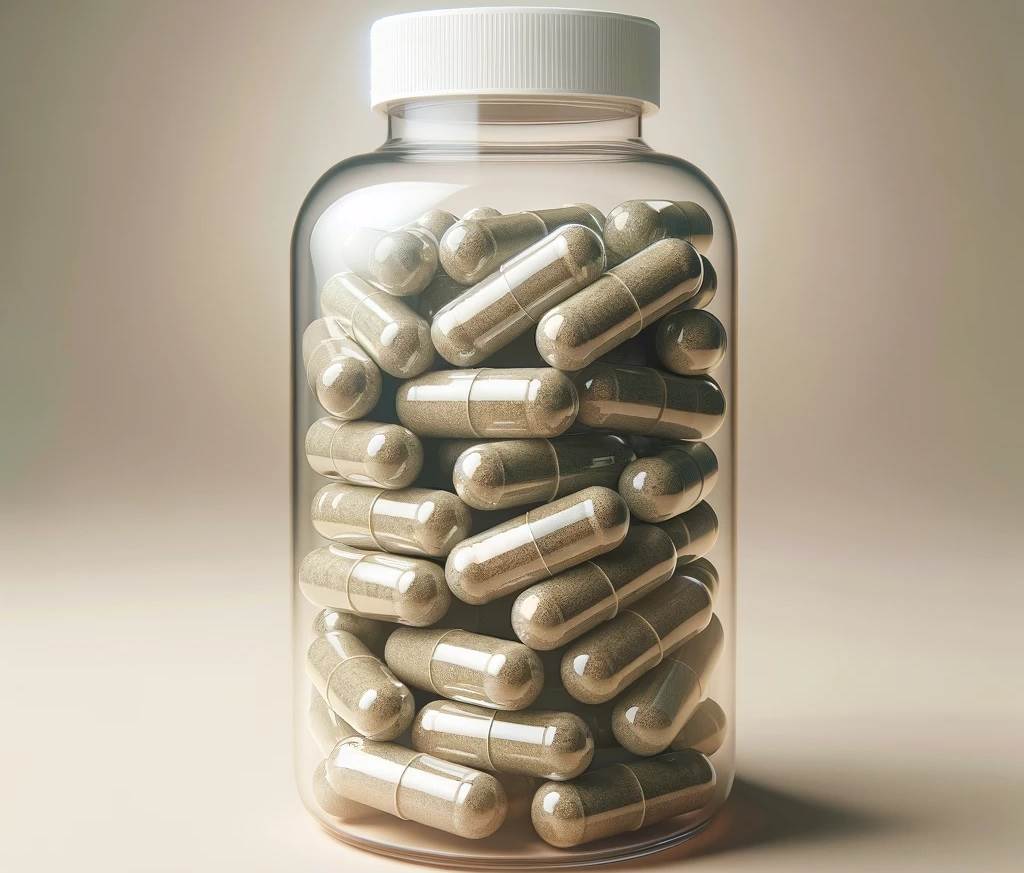In the bustling world of health and nutrition, where every nutrient plays a star role, fiber has grabbed its fair share of the spotlight. Let’s face it, we’ve all heard the buzz around fiber, but how much do we really know about how fiber supplements affect our gut? If you’re on the lookout for the ins and outs of fiber supplements, their benefits, side effects, and basically everything in between, you’ve hit the jackpot. So, buckle up as we embark on this fiber-filled journey.
The Fiber Fundamentals
Before diving deep into the effects of fiber supplements on our gut, let’s get the basics down pat. Fiber is the unsung hero of our diet, a type of carbohydrate that the body can’t digest. While that might sound unproductive, it’s exactly what makes fiber so crucial. It comes in two varieties: soluble and insoluble, both of which play unique roles in our health. But when our diets fall short, fiber supplements come to the rescue, offering a convenient way to get our fill.
Fiber supplements are not just a one-trick pony; they’re a versatile addition to our dietary arsenal. From powders and capsules to gummies, they promise to fill the fiber void in our diets. But as we turn to these handy helpers, it’s essential to understand how they work their magic in our gut.
The Digestive Delight
Now, let’s talk about how fiber supplements affect our gut, and trust me, it’s quite the party down there. When fiber supplements enter the scene, they get to work by absorbing water, which helps to bulk up our stool and makes it easier to pass. This is a game-changer for anyone who’s ever faced the dreaded discomfort of constipation. But that’s not all; soluble fiber forms a gel-like substance that slows down digestion, helping us feel fuller for longer, which can be a boon for weight management.
Moreover, this slow-down in digestion means that sugar is absorbed more slowly, helping to keep blood sugar levels in check. This is especially beneficial for individuals managing diabetes or looking to prevent it. So, in a nutshell, fiber supplements are doing more than just aiding digestion; they’re helping us maintain a balanced, healthy lifestyle.
Difference between soluble fiber and insoluble fiber
Soluble fiber absorbs water in your food, forming a gel-like substance that slows digestion. This process helps reduce cholesterol, regulates blood sugar, and may lower the risk of type 2 diabetes and cardiovascular issues. Foods high in soluble fiber include:
- Oatmeal
- Flaxseed
- Barley
- Dried peas
- Oranges
- Apples
- Carrots
- Beans
- Psyllium husk
On the other hand, insoluble fiber doesn’t absorb water but adds bulk to stool, aiding in its movement through the digestive system and relieving constipation. It’s associated with a reduced risk of diverticulitis and cardiovascular disease. Foods rich in insoluble fiber include:
- Seeds
- Nuts
- Dark green leafy vegetables
- Wheat bran
- Brown rice
- Bulgur
A Gut Feeling
Beyond just easing digestion, fiber supplements play a pivotal role in nurturing our gut health. They’re like the ultimate food for our gut bacteria, the good guys that call our intestines home. This relationship is crucial because a healthy gut flora is linked to a plethora of health benefits, from improved immune function to a lower risk of certain diseases.
By feeding the beneficial bacteria in our gut, fiber supplements help to fortify our gut barrier, reducing the risk of inflammation and certain gut-related diseases. It’s a win-win situation where our gut bacteria thrive, and we reap the health benefits. So, when we talk about how fiber supplements affect our gut, we’re looking at a holistic boost to our health.
The Flip Side
However, it’s not all sunshine and rainbows. While fiber supplements are a fantastic tool in our dietary toolkit, they come with their own set of considerations. Jumping into the fiber supplement bandwagon too quickly can lead to digestive discomfort, such as bloating, gas, and even cramping. This is because our gut needs time to adjust to the increased fiber intake.
Moreover, it’s crucial to understand that while fiber supplements are beneficial, they shouldn’t be seen as a direct replacement for the fiber we get from whole foods. Whole foods offer a complex array of nutrients along with fiber, which supplements alone can’t replicate. Hence, the key is to strike a balance, incorporating both fiber-rich foods and supplements into our diet as needed.
Fiber Supplements for Gut: Navigating the Fiber Supplement Maze
Choosing the right fiber supplement can feel like navigating through a maze, but it doesn’t have to be a shot in the dark. The trick lies in understanding the types of fiber supplements available and their specific benefits. For instance, psyllium husk is great for overall digestive health, while inulin supports gut bacteria growth. Knowing what you need will guide you through the maze to the perfect fiber supplement for your gut.
Additionally, it’s important to consider the form of the supplement. If you struggle with swallowing pills, a powder or gummy might be more up your alley. Remember, the best supplement is the one you’ll consistently take, so choose a form that fits seamlessly into your lifestyle.
The Hydration Equation
When increasing your fiber intake through supplements, there’s one golden rule you can’t afford to ignore: hydration. Fiber works best when it has enough water to interact with, which is why drinking plenty of fluids is non-negotiable. Without adequate hydration, fiber supplements can lead to constipation rather than prevent it, which is the exact opposite of what we want.
So, make sure to drink up! Water, herbal teas, and other non-caffeinated beverages are your best bets. Keeping hydrated not
only helps fiber do its job but also supports overall health and well-being.
Fiber Supplements for Gut: Listening to Your Body
Understanding how fiber supplements affect our gut also means tuning into our body’s signals. Starting with a lower dose and gradually increasing it allows your body to adjust without much fuss. It’s also a smart move to keep an eye on how your body reacts to different types of fiber supplements, as everyone’s gut is unique.
If you experience any adverse effects, it might be a sign to adjust your approach. Whether it’s switching types, adjusting the dose, or even reevaluating your need for a supplement, listening to your body is key. After all, the goal is to support your health, not to create discomfort.
Supabottle’s Picks For The Best Fiber Supplements On the Market
Metamucil
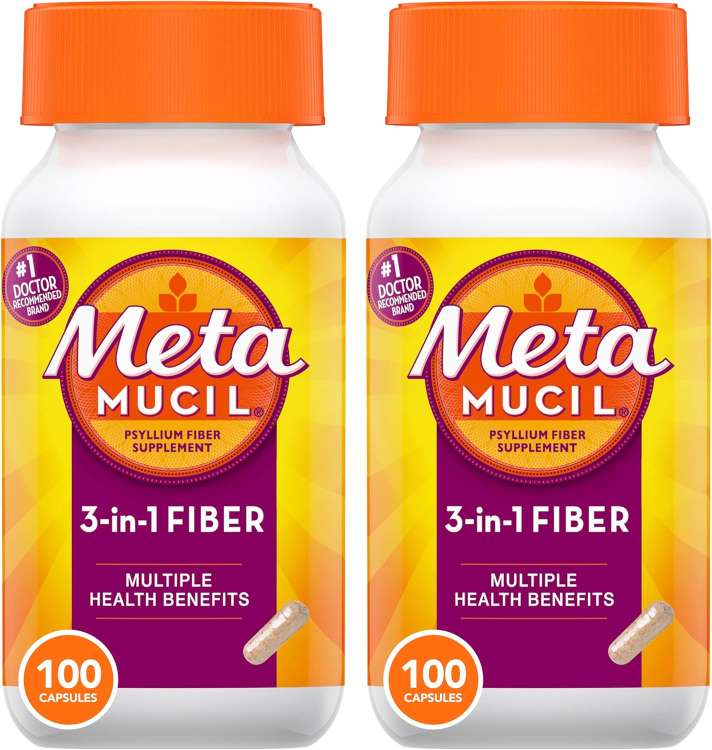
Credit: amazon.com
Metamucil, containing psyllium, derived from the husks of Plantago ovata seeds, consists of 70% soluble fiber, aiding in promoting feelings of fullness and slowing down digestion. Additionally, it contains 30% insoluble fiber, which passes through the gut largely intact, providing bulk and assisting in regulating bowel movements.
Research suggests that psyllium, found in various Metamucil products, can alleviate symptoms associated with conditions like irritable bowel syndrome (IBS), Crohn’s disease, and anal fissures. It offers different forms of Metamucil to cater to individual needs, such as Metamucil Premium Blend Sugar-Free Orange Powder sweetened with stevia, a suitable option for those with diabetes seeking a daily fiber supplement. Additionally, there are Metamucil gummies and fiber thin crackers available to suit preferences.
Pros:
- Contains a blend of soluble and insoluble fibers
- Offers a wide variety of Metamucil fiber products
Cons:
- The number of capsules required per serving may be inconvenient
- Higher price point
- Not third-party tested for purity
Product Details: Active Ingredient(s) (per serving): Soluble fiber 1.8 g (psyllium husk)
Yerba Prima Fiber Plus Senna Powder
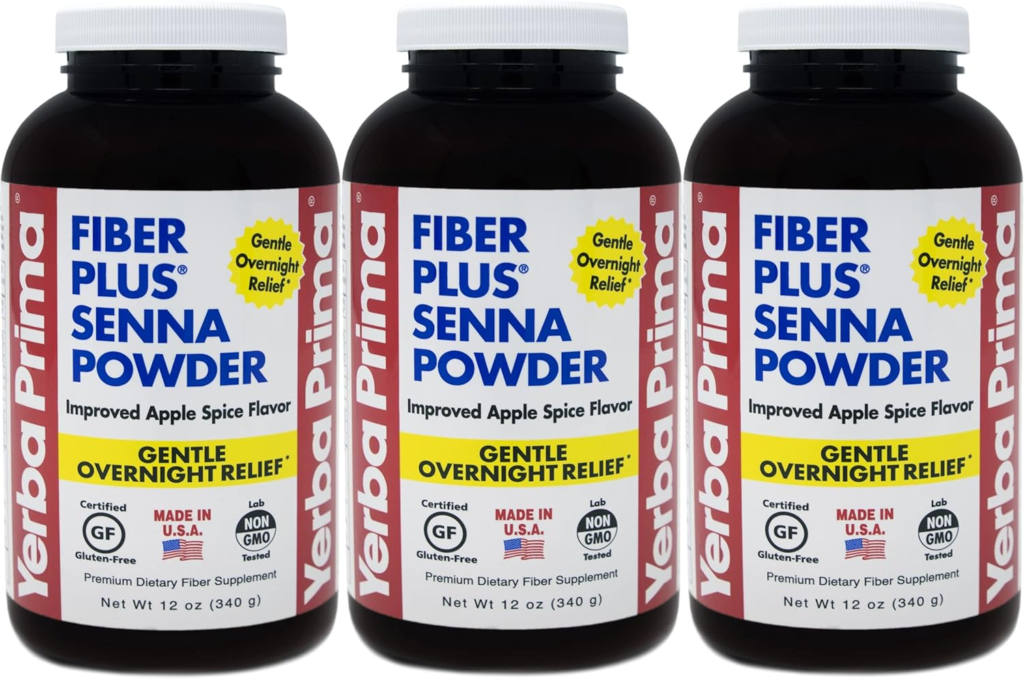
Credit: amazon.com
Yerba Prima’s Fiber Plus is a potent formula crafted to restore and maintain digestive regularity effectively. Combining the benefits of fiber with the colon-cleansing prowess of senna, it offers a unique blend for comprehensive digestive support. This formula boasts a premium standardized extract of senna, ensuring consistent results in promoting gentle overnight bowel activity.
What distinguishes Fiber Plus is its balanced approach to bowel health. Alongside senna, it features a complete fiber formula containing all five fiber types, complemented by ginger to balance senna’s effects and promote mild bulking fiber benefits. This combination aids in regularity and facilitates the absorption and removal of toxins and waste material in the colon.
Furthermore, Fiber Plus incorporates purifying herbs like ginger root, dandelion, and red clover, providing additional support for cleansing and balance in the digestive system. Ginger root soothes discomfort and aids digestion, while dandelion and red clover enhance Fiber Plus’s cleansing function for maximum benefits. With its comprehensive blend, Fiber Plus stands as a reliable choice for maintaining optimal digestive wellness and long-term bowel health.
Pros:
- Contains a blend of soluble and insoluble fibers
- Yerba Prima is oldest, most trusted manufacturer of fiber & wellness products in the United States.
- Unique test
Cons:
- The spice level could be higher for your test
- Not third-party tested for purity
Product Details: Active Ingredient(s) Psyllium seed husks, Gluten Free oat bran, acacia gum, Non-GMO soy fiber, ginger root, natural flavor, senna extract 10%, sennosides, apple fiber, stevia extract, red clover tops extract 4:1, dandelion root & leaf extract 4:1, cellulose
Garden of Life Dr. Formulated Organic Fiber Powder
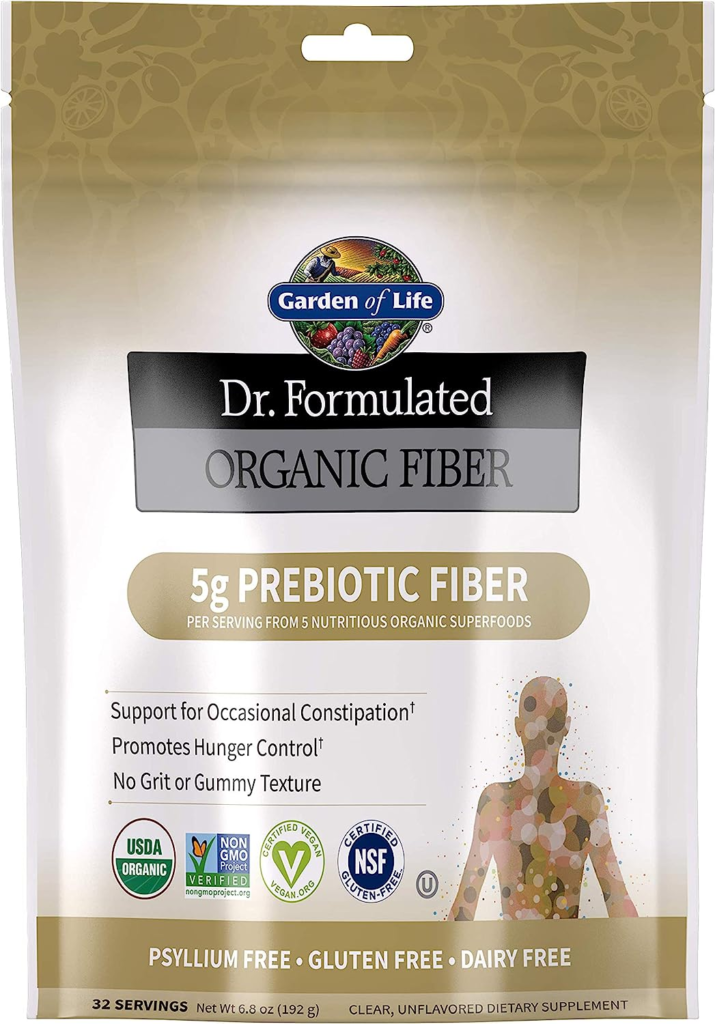
Credit: amazon.com
Garden of Life is a certified B Corporation, committed to stringent social and environmental standards. This designation ensures transparency and accountability, promoting an economy that prioritizes inclusivity, equity, and regeneration.
Their Organic Fiber Supplement delivers 5 g of prebiotic fiber per serving, sourced from organic acacia, orange peel, baobab fruit, apple peel, and cranberry fruit. Available in unflavored and Citrus flavored powders, it offers a mix of soluble and insoluble fibers known to reduce inflammation, aid digestion, and support a healthy gut microbiome.
Pros:
- Sugar-free
- Blend of soluble and insoluble fibers
- Unflavored powder seamlessly mixes with any food or liquid
Cons:
- Higher price point
Product Details: Active Ingredient(s) (per serving): Dietary fiber 5 g (20% DV)
Pure Encapsulations PureLean Fiber
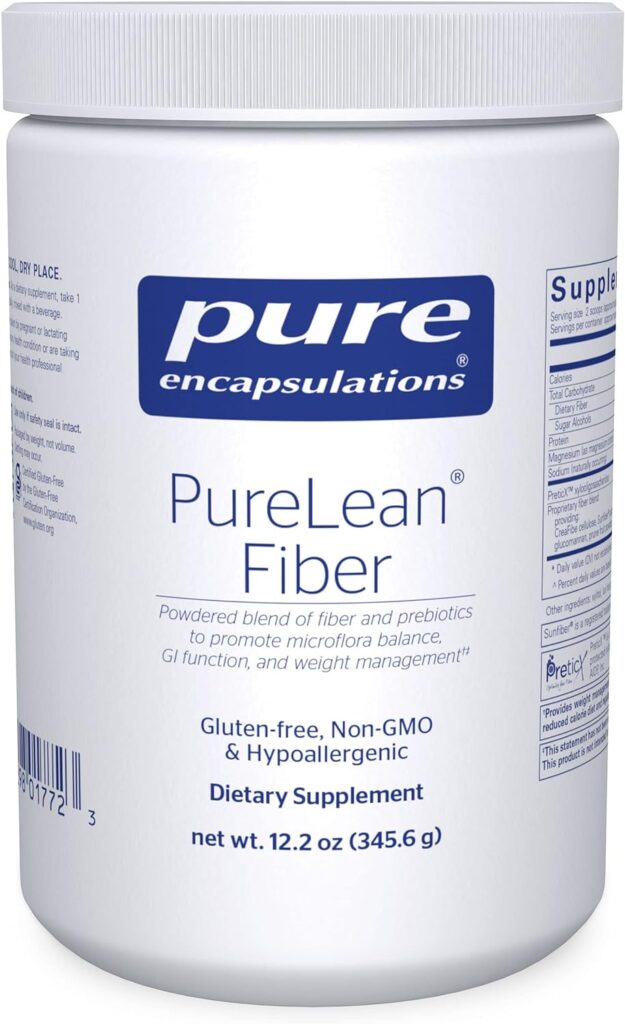
PureLean Fiber is a standout choice for supporting digestive health and regularity, offering a balanced blend of soluble and insoluble fibers. Each serving supplies a minimum of 6 grams of fiber, with 3.5 grams derived from soluble sources like glucomannan, guar gum, apple pectin, and prune fiber, and 3 grams from insoluble sources including rice bran, cellulose, and flaxseed. This combination promotes satiety, aids digestion, and supports nutrient absorption by slowing the rate of digestion.
What sets PureLean Fiber apart is its commitment to quality and purity. Crafted with premium ingredients sourced from trusted suppliers and guided by nutritional experts, each supplement undergoes rigorous testing to ensure potency and purity. Notably, Pure Encapsulations products are free from a range of allergens and unwanted additives, including wheat, eggs, tree nuts, gluten, artificial colors, flavors, sweeteners, GMOs, and unnecessary binders, fillers, and preservatives. For those seeking a reliable fiber supplement with a focus on quality and purity, PureLean Fiber is an excellent choice.
Pros:
- Sugar-free
- Blend of both soluble and insoluble fibers
- Gluten- and allergen-free, without any artificial additives
Cons:
- Higher price point
- Relatively high dose of fiber may not be suitable for everyone
- Contains 2 g of sugar alcohol, which may cause sensitivity in some individuals
The FAQs of Fiber Supplements for Gut
Before we wrap up, let’s tackle some frequently asked questions that might be lingering in your mind:
- Can I take fiber supplements every day? Yes, you can, but start slow and follow the recommended dosage on the product.
- Will fiber supplements help me lose weight? Fiber supplements can aid in weight management by helping you feel fuller for longer, but they’re not a magic weight loss solution.
- Can children take fiber supplements? It’s best to consult a healthcare provider before giving fiber supplements to children.
- Are there any people who shouldn’t take fiber supplements? Individuals with certain gastrointestinal conditions should consult their doctor before starting fiber supplements.
In Conclusion
Understanding how fiber supplements affect our gut reveals a complex yet fascinating interaction that underscores the importance of fiber in our diet. Whether it’s aiding digestion, supporting gut health, or helping manage weight, the benefits of fiber supplements are manifold. Yet, it’s essential to approach them with balance and mindfulness, integrating them into a diet rich in whole foods and plenty of fluids.
So, if you’re considering adding fiber supplements to your diet, remember to listen to your body, stay hydrated, and choose a supplement that aligns with your health goals. With the right approach, fiber supplements can be a valuable ally in your journey towards optimal health.


